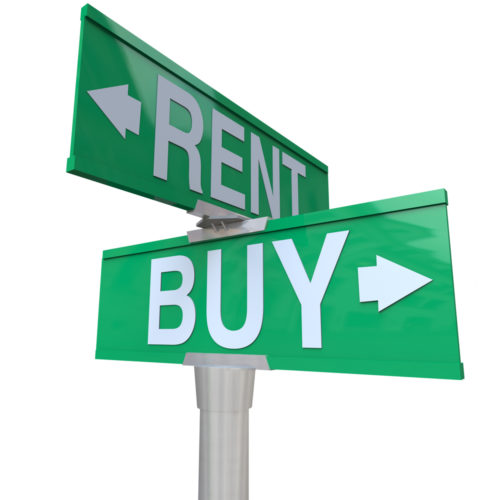Whether you’re renting or buying a home, determining which path is right for you is a big decision. Before you decide, it’s important to consider all of the factors that go into each, including the overall costs and maintenance required, your timeline, and of course, other factors like taxes and the credit score you need in order to rent or buy.
Before you make a final decision about whether to rent or buy, it’s important to weigh the pros and cons of rental properties and homeownership
Table of Contents
Renting vs. Buying a Home
There are many reasons someone might consider whether to rent or buy a home. If you’re ready to take the next step in life, you may want a place of your own. Perhaps your family is growing and you need more space than your current living situation offers. Furthermore, you could be struggling with the decision because it costs less to rent in the short term, but in the long term it’s more financially advantageous to own a home.
Regardless of your reasoning for wanting to rent or buy a home, weighing the pros and cons of each option is a vital step. Here, we’ll break down the considerations you should make prior to renting or buying a home, including the costs, length of time, maintenance, taxes, and credit score you’ll need to do either one.
Costs
What you can actually afford to pay monthly will be a huge determining factor in whether you rent or buy a home.
Renting
Renting a home has different costs than what you would expect when buying a home. For example, rental properties require a security deposit that allows the owner of the property to protect themselves against damage you may cause during your rental period. Typically, the security deposit is the first and last month’s rent.
When you sign a rental agreement, analyze it carefully to see if any other costs, such as cable, gas, or electricity, are covered in the cost of your monthly rent. Paying your rent late could also result in unexpected fees, so look into that information in the agreement as well.
Buying
Buying a home comes with its own unique costs to you. In addition to a monthly mortgage payment that includes your loan’s principal and any interest, you are also responsible for paying homeowner’s insurance.
In some cases, you may be able to rent-to-own a property. This allows you to pay rent for a period of time until you can afford to buy the owner out.
A substantial down payment is required to purchase a home, too. If your initial deposit it less than 20% of the home’s value, you’ll typically have to purchase private mortgage insurance (PMI). This will increase your monthly mortgage payments for a period of time until you’ve payed enough to equal a 20% down payment.
Other hidden expenses with the purchase of a home include closing costs, property taxes in the area, and realtor fees, which can drive up the overall price of the home you purchase. Similarly, the type of mortgage you get (variable vs. fixed) can change what you owe on your mortgage payments each month.
Length of Time
How long you plan on living in the home will help determine whether renting or buying is the right option for you.
Renting
If you only want to live somewhere temporarily, renting is probably your best option. When you decide it’s time to move again, you don’t have to worry about staging, listing, and selling your home. Instead, you simply don’t renew your lease and you’re on your way.
Buying
If you want to live in a neighborhood for a long period of time, buying a home may be the best option. Renting long-term isn’t the best option, especially because what you are paying in rent could be going towards the costs of a mortgage. Over enough time, the amount of rent you pay could even go beyond the cost of a mortgage.
If you become a member of a homeowner’s association (HOA), you’ll have to pay monthly dues, but this often covers the cost of services like landscaping and exterior property maintenance.
Choosing to buy instead of renting long-term also allows you to build equity and add value to the home, boosting what you can sell it for in the future if you choose to do so.
Maintenance
Any way you look at it, homes come with maintenance costs. Discover the kinds of maintenance costs that come with renting or buying a home.
Renting
Renters typically have it easier than homeowners, as the landlord is liable for repairs to the property. However, landlords aren’t responsible for it all. Your rental agreement should outline the kinds of maintenance and repairs your landlord covers, such as heating and cooling or plumbing repairs.
In the event that your landlord does not cover these costs, it is your responsibility as the renter to handle them.
Buying
All homes need maintenance over time, from ongoing seasonal maintenance to your HVAC system to emergency repairs. Unlike renting a home, owning a home makes you financially responsible for any and all repairs that need to be made.
Taxes
Taxes are another factor at play when it comes to deciding whether to rent or buy a house.
Renting
You won’t be paying property taxes if you rent a home, but that means you cannot claim those payments for a deduction come tax time.
Buying
When buying a home, property taxes play a big role in the overall cost of your mortgage. Ultimately, property taxes are based on location, so the amount you pay comes down to where you’re buying a home. You may be able to get some of this money back on your federal tax return. If you itemize your taxes, you may also be able to write off mortgage interest payments on your next filing.
Credit Score Needed
Your credit score plays a major role in deciding whether to rent or buy a home.
Renting
If your credit score isn’t very high, this could mean higher interest rates on a loan or a higher down payment to buy a home, making renting your best option.
You still need decent credit to rent a home. Just as with mortgage payments, your credit score may affect what you pay in rent each month or the security deposit you have to put down in order to secure the rental home.
If you have no credit, renting a home could allow you to establish it, but only if your landlord submits information to the credit bureaus.
Buying
You need a credit score to get a mortgage. If you have a bad credit score below 580, you may get approved for a loan but the rates won’t be favorable. Your credit score determines what the down payment of your mortgage will be, as well as what your monthly mortgage payments look like with interest.
Buying a home allows you to build your credit. On-time monthly mortgage payments can help increase your overall credit score.
Choose What’s Right for You
Whether you rent or buy a home, there’s no right or wrong decision. Ultimately, it comes down to choosing what’s right for you and your situation. To further help weigh the pros and cons of each, talk with someone you can trust and assess your savings as well as your budget to determine what you can afford.
Consider factors like the location of the home, what you want it to look like, and the amenities you want it to include. From there, you’ll be able to make a reasonable decision about whether to rent or buy a home.
Image Source: https://depositphotos.com/





